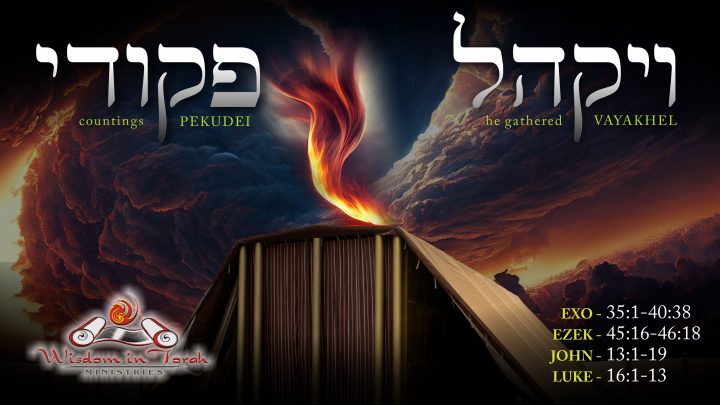
Don't Forget to Share!
This Parashah covers the building of the tabernacle. It is a combination of the two Torah portions so please be sure to watch both videos in the appropriate years. It deals with the review of the Tabernacle, the holy anointing of the Priesthood, and articles of the Mishkan. We also see the importance of graded holiness, the functionality of the altar, the two parts of the "ark of the covenant", and see the importance of understanding faith.
This page includes Torah Portions from multiple years covered by Wisdom in Torah. Each year we covered the Torah from a different perspective so you can explore each Parashah from a different perspective and focus.
- 2010 Portions: Focus on Messianic connections in the Parashah
- ANET Portions: Focus on the ancient Near Eastern cultural context of the Parashah
- Mitzvot Portions: Focus on explaining and exploring the commandments found in the Parashah (in progress)
- 2015 Portions: Revisiting the Parashah looking at the ancient cultural context more in depth with additional areas that have been researched
- Brit Portions: Focus on connecting the Brit Hadashah (New Testament) to the Parashah
Oops, this is members-only content
This page requires at least a basic level membership to access the teaching.
Audio
Oops, this is members-only content
Resources
The following is a list of recommended resources for this teaching:
- There are currently no resources for this portion.
Categories
48 thoughts on “Torah Portion Vayakhel-Pekudei Complete”
Leave a Comment
You must be logged in to post a comment.

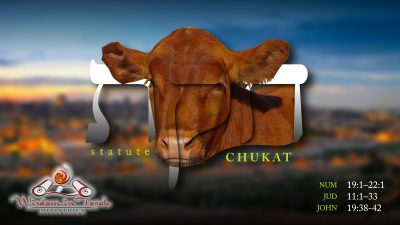
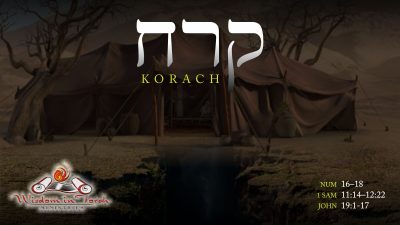
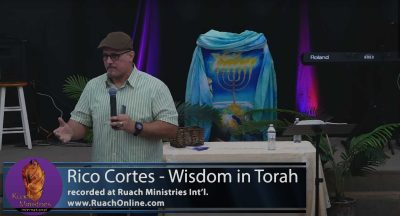
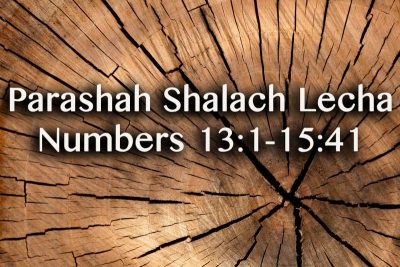
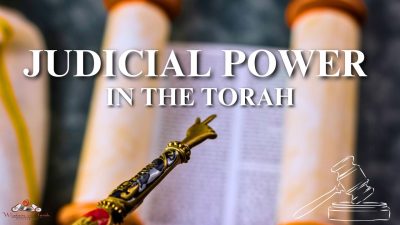
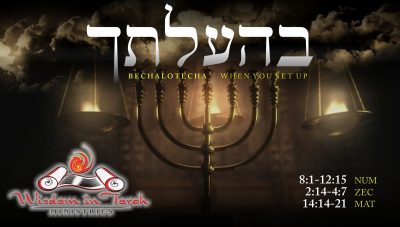
Rico:
Since beginning my Torah studies with you several years ago on GLC and now on Wisdom in Torah, my understanding of YWVH’s words and true purpose have increased exponentially. With each Torah portion comes at least one major insight and revelation. Your teachings are true blessings to me, Rico. Thank you so much for being there.
Shalom,
Sher
Rico, can you please supply us with the references that you used in part two talk about the Greek language and people taking bible verses to mean Christ was risen on a Sunday? Also, I would like the reference where you quoted the Roman creed. I think those are valuable resources and I would like use them with teaching. Thanks
Hi Rico,
Wow, well listening to this portion is helpful.
I have really been struggling with “work” on the Sabbath.
I am a photographer and my husband a videographer (2nd job).
While weddings are a “choice” to take, I have declined recently about 6-7
because I am wanting to keep the Sabbath rest.
Recently, I accepted 1, because we are struggling financially 🙁
A sister shared that she thought it was a service photographing someone’s wedding.
Many people this day and age consider their photographs and video the memory of their day.
I just keep thinking, I am getting paid, it is a lot of work, it’s not something done for play.
Any how, I was thinking, how would a rabbi or any other part of the vendors on this day
of a couple making a covenant together….how does a rabbi look at this. Do those that are Torah observant
do they NOT get married on the Sabbath? or do they? I feel pulled in 2 different directions.
I do not want to build my business on Sabbath weddings : ) Ya know what I mean?
But am I viewing this the wrong way.
How would you instruct your daughter on this?
Thanks so much for your time.
Shalom,
Cheri
Shabbat Shalom everyone!!! I was just meditating on the confrontation with Yahshua and the Pharisees over working on the Shabbat in Matthew 12 and I had this thought. I believe Rico is correct in pointing out Deut 23:24-25 to say that it was lawful for the disciples to pick the corn/grain from a neighbors field but perhaps using these verses is not the best defense for doing so on the Shabbat as the context of the chapter is not specifically regarding things that are considered work on or not on Shabbat. I submit that perhaps we should ask them, Jews/Christians, to show us where in Torah picking grain with your fingers and instantly eating it is considered work and is forbidden. We might let them know that if this is the case then picking up food from a plate or anywhere else and putting it in your mouth would also be considered work. Same basic physical exertion and motion. So then we can ask them to show us where eating is forbidden on Shabbat in Torah. I believe their natural response and last ditch effort to defend their point of view will be to reference what happened to the man who was picking up sticks on Shabbat. Now I believe there is no way we can prove the man was dramatically shaking his fist in defiance of Yah because the subtext is not clearly given in scripture but what is given is that the man was willfully disobeying YHVH by picking up sticks (carrying a load) with the obvious intention of sustained willful disobedience (kindling a fire to most likely do more work). Perhaps then we can point out to them that comparing the two is like comparing apples and pineapples. Had the disciples been picking grain and placing it in a basket to later grind with stone to make into bread they would have a point but of course this is not the case.
Alright, back to the words of our Righteous Elohim. Thank you Rico for allowing Yahuweh to use you to bless us. Shabbat Shalom!
Robert Phelps
Concerning Grape Juice verses Wine for the benefit of anyone who has never been involved with growing Grapes.
Grapes are “naturally” a seasonal fruit and the availability of Fresh grapes or Fresh Juice is only a mater of variety and ripening season.
Today they are available year around ONLY due to importing from other countries or from places that have a different growing season then the “Local season.” Due to Freezing today we also have an availability of juice year around that was not in existence 3500 years ago.
In Israel the growing season for grapes in any one year would be 6 weeks to 2 months long. Fresh grape juice would be available from pressing only for a SHORT period of time after ripening.
Any grape juice put into wine skins would be “juice” for less than 1 week. After that you had better NOT put new juice into “old” wine skins of you will have a big mess.
I know of no way to preserve grape juice past a few days before the natural yeast on the grapes themselves causes fermentation and thus Wine. IF you boil grape juice to kill the yeast the juice will mold and rot in a few weeks at most.
By Passover there would be no grape juice. It would be fully fermented wine and considered old wine. For Y’shua to serve Juice for Passover would be impossible short of a miracle. Also when He said he would not drink of the fruit of the vine until He drinks with us in the Kingdom.. has to do with Priests not drinking Alcohol and serving in the Temple.
By the Fall Feasts of the 7th month they probably had some late vintage Juice, early vintage New wine and Old wine from last season (and a lot of vinegar).
I also believe they used wine diluted in their drinking water as a sterilizer.
The Fruit of the Vine was probably (I believe) a very important source of refreshment and a vital part of life in those days. The over use was the problem but the “over use” “in moderation” at Feast times was allowed.
Strong Wine was made by adding Sugar… Honey or other sweetener to increase the alcohol content. Various Beers were also made from grains.
Just my 2 cents worth.
Shalom
Rico,
I read for the KJV of the Bible in all your studies. It was a bible i was given on confirmation in the Lutheran church. I can attest to the reading you were given. But now for that last few months, and my eyes being open i can see the problem that my friends in the Lutheran church dont see. Because I dont think Yah would allow his text to be corrupted. What I see in the KJV is this, Its at evening everytime, then the quote is first day of the week with First being Italicized. But they have no concept of how days work to Elohim. If im correct the making of the world started with darkeness, then light, So why Shabbat starts on darkness of Friday, to Darkness or Saturday, makes sense to me. Why all the verses you quoted make no sense to others is day starts with darkenss and ends with it and my KJV says eevn, or evening. Its not understanding what a day really is? Look forward to your commentary on my thoughts.
Shalom to you and your Family, you have been a blessing to mine.
Shalom David
NO! Yeshua did not break Sabbath and NO! I did not say we can do anything we want. We are to rest on the sabbath.
You posted something that sounded like the way christians believe on regards to the sabbath and teaching that sabbath is not valid which I do believe that sabbath is eternal and forever. Yeshua did acts of kindness by doing the healing and the rabbis of the time consider that work. Also, Yeshua and the disciples did eat of the corn but if you read what Torah says about that: let me quote the verses
Mt 12:1 ¶ At that time Jesus went on the sabbath day through the corn; and his disciples were an hungred, and began to pluck the ears of corn, and to eat.
If you read the reference to this verse you will notice that Yeshua’s disciples did not brake the sabbath.
De 23:25 When thou comest into the standing corn of thy neighbour, then thou mayest pluck the ears with thine hand; but thou shalt not move a sickle unto thy neighbour’s standing corn.
David Context is very important and when people say that Yeshua broke sabbath then there is a problem because Yeshua had to keep the Torah if HE did not follow the Torah then He is not the Messiah and praise Yah that He did follow the Torah completely so that we can have eternal redemption.
Thanks
Rico
hey Rico, great teaching. I love the idea of sabbath too. Your sure well informed about the Hebrew language and culture and traditions. It’s easy to listen to you teach.
There is one thing i’ve noticed that you do that i’ve found easy to get caught up in. YOu mention how the Jews developed hundreds of sublaws concerning the sabbath. But, then you say that mowing the lawn is work. But is it? isnt that really up to a person to decide?
Are you , in a way, doing what the Jews who have made those hundreds of rules of what to do and not do on the sabbath have done? your telling someone who might find total relaxation in mowing, in snowskiing, jetskiing, canoeing,hicking etc.
I find it very relaxing to garden. I love doing it everyday. It’s a time that i feel brings me close to God. It’s very quiet and communal. I can snese Gods presence there almost more than any where else. My mom would never do such ‘work’ on the sabbath. I dont do the vigorous type of gardeinng on the sabbath, but the more calming activities.
Jesus did ‘work’ on the sabbath, remember? He even admitted it. After healing the infirmed man, who had been infirmed for 30 years, on the sabbath, the Jews saught to kill him: in John 5:16 “So, because Jesus was doing these things on the Sabbath, the Jewish leaders began to persecute him. 17 In his defense Jesus said to them, “My Father is always at his work to this very day, and I TOO AM WORKING.” 18 For this reason they tried all the more to kill him; not only was he breaking the Sabbath, but he was even calling God his own Father, making himself equal with God.”
WORKS of righteousness. Works from the heart. Works for the good of others and for us. Jesus picked corn and began husking it to eat it, thats another one the Jewish leaders were upset about. JEsus was destroying their most sacred identification emblem, the sabbath.
I’m sure you believe that the sabbath was for a sign that GOD is the creator and the one that sanctifies His people. There is a blessing in remembering it and remembering it’s holyness, it’s holy and prophetic meaning.
Also, in your video part two, are you quoting from a book titled ”Bible readings for the home’? its sounds like the exact same quotes that are in that book. Great book!
Keep up the good work Rico!
God bless you.
david
Thank you for your comments. I think for me and my house…we’ll stick to abstaining from any intoxicating drink all together. The verses in Scripture that speak where “strong drink” has been indulged in, seem to me… only lead to un”Yah”ly behavior. To me, that is a “HUGE” stumbling block to the world that is reading “our lives” instead of the Scriptures. Besides, aren’t we suppose to “look different from the world?” I think that even the world expects us to look different from them, and when we sit down next to them, and drink (or do whatever) just like them, I think they see that we have nothing better to offer them, so why would they even listen to what we have to say? Think back to the time, when we were still in the world. Strong drink is what we indulged ourselves in, and most of us did things that we never would have done, had we not been under the influence of whatever our vice was at the time. We are called to be “Set-apart from the world.” I have to ask, at what sip or what point do you think it might put you into the catagory of becoming “a drunkard that will not enter into His Kingdom?” If He didn’t mean those words, I propose that He never would have said them. Those words speak volumns to me, and I guess that I am not willing to trust my interpetation of them, taking a chance that I was wrong! I am just so thankful that he brought me OUT of darkness (the world and the things I USE to do), and INTO His marvelous light! I can’t imagine Him being happy with any of us going back to the very things… he brought us out of. There you go, and there you have it! Shalom to all –
Shalom
I do not disagree with your view but I also believe that Yah gives us a responsibility to be accountable and do enjoy his creation but have self control and also to not act like the world. The problem is the lack of control and maturity of the believers.
In the reading of the Thorah the Creator reveals the difinition of “wine” because this same Creator is going to be partaking of wine and is going to use wine as an emblem of his blood when He becomes Immanu-el.
(Gen 9:20 KJV) “And Noah began to be an husbandman => (agriculturalist), and he planted a vineyard:=> (grape orchird)”
(Gen 9:21 KJV) “And he drank of the wine, and was drunken; and he was uncovered within his tent.”
(Luke 5:39 KJV) “No man also having drunk old wine straightway desireth new: for he saith, The old is better.”
(John 2:9 KJV) “When the ruler of the feast had tasted the water that was made wine, and knew not whence it was: (but the servants which drew the water knew;) the governor of the feast called the bridegroom,”
(John 2:10 KJV) “And saith unto him, Every man at the beginning doth set forth good wine; and when men have well drunk, then that which is worse: but thou hast kept the good wine until now.”
From these readings we can see that there is “GOOD WINE” and wine that is “WORSE”.
(Deu 14:26 KJV) “And thou shalt bestow that money for whatsoever thy soul LUSTEHT AFTER, for oxen, or for sheep, or for WINE, or for STRONG DRINK, or for whatsoever thy soul desireth: and thou shalt eat there before the LORD thy God, and thou shalt rejoice, thou, and thine household,” Jawh is a discerner of the hearts of mankind.
(Jer 17:10 KJV) “I the LORD search the heart, I try the reins, even to give every man according to his ways, and according to the fruit of his doings.” The WAY in which this tithe money was bestowed (applied) would reveal the LUST of that persons heart. Was it being spent to buy oxen (high investment), or sheep (low investment), wine (good investment) or strong drink (bad investment)? The second tithe spoken of here is how JAWH “searched the heart of those coming to His feasts and His temple at Jerusalem the designated place to celebrate the FEASTS OF JAWH. Notice the words of the Torah – and you can bestow => (apply) that money for whatsoever -“THY SOUL LUSTEHT AFTER”. The lusts of the heart are beig tested here, the “LUST” of the heart would be revealed.
Shalom Brothers and Sisters,
(Mat 4:4 KJV) “But he (Jahheshua) answered and said, It is written, Man shall not live by bread alone, but by EVERY WORD that proceedeth out of the mouth of God.” On the teaching of “wine” versus “strong drink”. The Hebrew word for strong drink is “shekar” (Strong’s H7941) an intoxicant, intensly alcoholic liquor = strong wine. There it is in Strong’s. Where did the “strong wine” come from? How did it become STRONG? It was not because STRONG’S CONCORDANCE refers to it as “STRONG”. It came from wine that was not “strong” to begin with. It was still “wine” but at some point it became “strong wine” AN INTOXICATING LIQOUR. IT WAS THE MOUTH OF JAWH THAT DEFINED IT AS “STRONG DRINK” This determination was revealed by the CREATOR who knows the elements of wine in all of its ramifications. Strong drink is what the creator calls it. The creator is the Aleph Tev the Thorah. Every word that proceeds out of his mouth is full if infinite wisdom. We humans are finite and always refer the things from this perspective unless the Thorah is our guide. More on how the fresh liqour of grapes becomes “strong wine” with the next post.